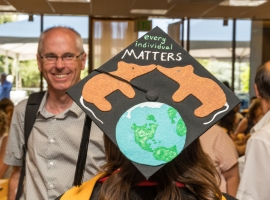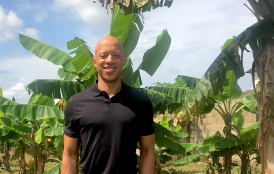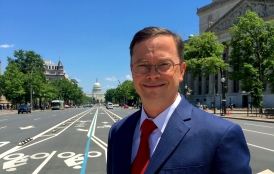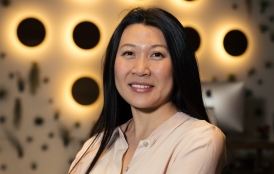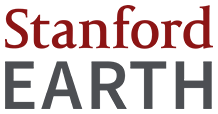The Stanford School of Earth, Energy & Environmental Sciences is now part of the Stanford Doerr School of Sustainability.
This page is currently being maintained for archival purposes only. For the latest information, please visit us here.
In final commencement as dean, Matson tells graduates to “get engaged and stay engaged”
Dean Pamela Matson commended graduating students for their accomplishments, emphasizing their ability to have a lasting impact in the years ahead.
By
Danielle Torrent Tucker
June 23, 2017
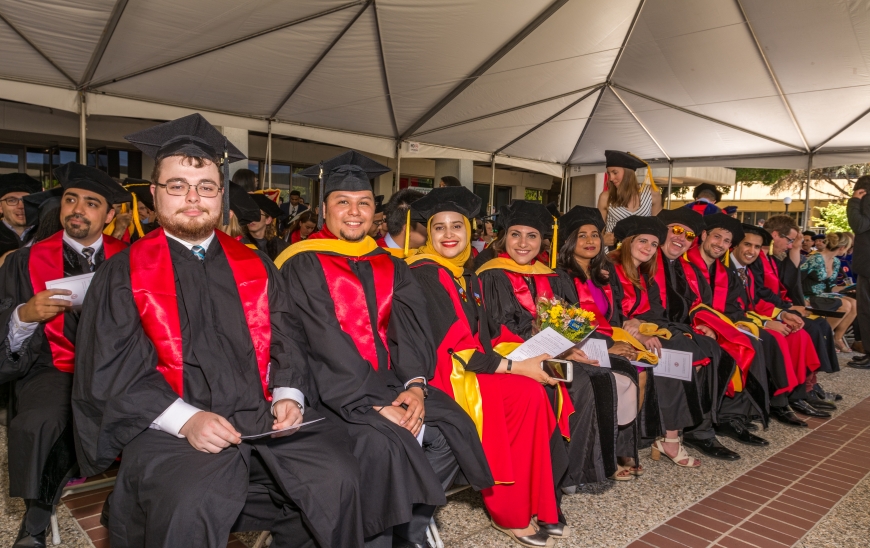
<p>Stanford Earth students gather for the 2017 diploma ceremony, held June 18, 2017 on the Mitchel Earth Sciences patio. Photo Credit: Javier Flores</p>
The key to happiness is using your knowledge and skills to do some good for the world, according to Pamela Matson, the Chester Naramore Dean of the School of Earth, Energy & Environmental Sciences.
Addressing the school’s graduating students during the degree ceremony June 18, Matson emphasized the importance of solving the challenges of our planet: increasing the energy, water, food and other resources to sustain a population growing to 10 or 11 billion in our lifetime.
“All you need to do is use your knowledge, get engaged, stay engaged, stay hopeful and even optimistic, keep learning, and work hard on behalf of others as well as yourself,” Matson said.
Matson shared the graduates’ feeling of curiosity about what the future holds, since she will be stepping down as dean of the school by the end of 2017. She noted she has “had a very zig-zag path” and is “still trying to figure out what’s next.”
“This is a commencement day of sorts for me, too,” Matson said. “I share with you that uplifting feeling of the prospect of fresh beginnings.”
Matson will continue teaching and direct the new master’s program in Sustainability Science and Practice.
The School of Earth, Energy & Environmental Sciences awarded 166 degrees in the 2016-17 academic year: 36 Bachelor of Science, 79 Master of Science, and 51 Doctor of Philosophy degrees, from the Departments of Geophysics, Geological Sciences, Energy Resources Engineering, and Earth System Science, and from two interdisciplinary programs—the Emmett Interdisciplinary Program in Environment and Resources (E-IPER) and the Earth Systems Program.
Distinguished Alumni Award to George Thompson
During the ceremony, Matson announced the recipient of the school’s 2017 Distinguished Alumni Award as George Thompson, PhD ’49, a former chair of the department of geophysics and dean of the school. The Distinguished Alumni Award acknowledges alumni who have made outstanding contributions in government, business or academia. Mary Lou Zoback accepted the award on his behalf along with Thompson’s son, Paul.
Thompson’s dedication to Stanford spanned seven decades and he impacted generations of students with more than 50 years of teaching. He made significant contributions to the understanding of the Basin and Range Province, showing how gravitational contrasts created linear patterns in mountain ranges and valleys, a result of the stretching of Earth’s crust. He died May 12 at his home in Palo Alto, California at the age of 97.
“I learned from him that you could use geophysics as a tool to go after very large questions,”said Thompson’s former student David Scholl, who spoke about his legacy during a reception in his honor held June 16. “George is just one of those people in your life you’ll never forget.”
Mid-Career Alumni Award to Edgar Rangel-German
Dean Matson introduced a new honor, the Mid-Career Alumni Award, which will be offered annually to alumni 45 years and younger who have made significant contributions to civil, government, business, or academic communities. The 2017 award was given to Edgar Rangel-German, MS ’98, PhD ’03, for his exceptional contributions to energy reform in Mexico. Rangel-German died of heart failure March 23, 2016, at the age of 42.
A thought leader with a powerful reputation in the international community, Rangel-German was a key player behind the implementation of Mexico’s 2013 energy reform as a commissioner with its National Hydrocarbons Commission (CNH). Prior to that, he served in positions with Mexico’s Ministry of Energy and Department of Finance and Public Credit (SHCP). Rangel-German was instrumental in bringing about constitutional changes in 2013, opening the country’s oil and gas market to private investments and bringing technical expertise to increase production.
Excellence in Teaching Award to Richard Nevle
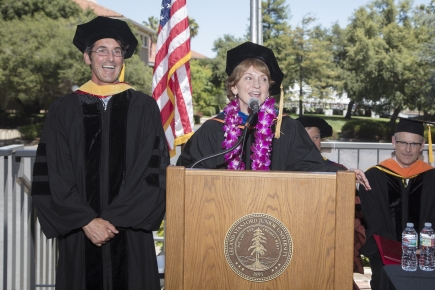
Richard Nevle was presented with the Excellence in Teaching Award during the ceremony for his inspirational teaching. He has served as Deputy Director of the interdisciplinary Earth Systems Program – the school’s largest undergraduate major – since 2015, and as a lecturer at Stanford since 2011.
Nevle’s nomination letters from students and alumni noted that “he treats his students with the utmost respect, running his classes as a conversation designed to leave both sides richer, and not a one-way exchange.”
One student’s nomination letter remarked on Nevle’s tradition of reading John Muir’s writing aloud with a Scottish accent, impersonating the French gentleman who once owned some of the land on which Stanford now sits.
“As an aspiring educator myself, I look to Richard as a role model,” the student wrote.
University Awards
Prior to the degree ceremony, the university awarded honors to exceptional faculty, staff, and students.
Stanford Earth lecturer Dan Reineman, PhD ’15, received the Walter J. Gores Award, the university’s highest teaching honor, “for being a knowledgeable, caring, enthusiastic and thoughtful mentor” and “for his teaching and participation in the Wrigley Field Program in Hawaii, which facilitated exploration and self-driven discovery for students. He was honored “for being a beacon of light and positivity for students.”
Joey Nelson, PhD ’17, received the Lyons Award for building awareness around LGBT rights through events such as the Queer Perspectives Speakers Series and the Trans 101 workshop and through the founding of oSTEM, Out in Science, Technology, Engineering and Mathematics, as well as for mentorship in the School of Earth, Energy & Environmental Sciences.
Stanford Earth Student Awards
The Centennial TA Awards were presented to teaching assistants Carl Hoiland and Eric Gottlieb (GS), Kira Minehart and Scott Roycroft (Earth Systems Program), Roger Michaelides (Geophysics), Ginny Selz (ESS), and Holger Teichgräeber (ERE).
Twenty students won the Dean's Award for Undergraduate Academic Achievement:
Earth Systems: Isabella Badia-Bellinger, Ariel Bobbett, Sarah Brickman, Michaela Elias, Emma Fisher, Lauren Gibson, Joseph Hack, Emma Hutchinson, Amy Kim, Erica Knox, Alexander Mesher, Claire Miles, Jackie Mogensen, Fiona Noonan, Zachary Ostroff, Jaclyn Phi, Katherine Roberts, Alexandra van Alebeek; Geophysics: Veena Patel, Ethan Williams
Additional awards, presented by departments and programs, follow.
Geological Sciences
- Harriet Benson Fellowship Award: Michelle LaComb and Sulgiye Park
- Outstanding Graduate Student Award: Kimberly Lau
Energy Resources Engineering
- Frank G. Miller Fellowship Award: Jingfan Wang and Olga Fuks
- Henry J. Ramey, Jr. Fellowship Award: Wenyue Sun
- William H. Brigham Memorial Award: Ogy Grujic
Earth Systems Science
- Award for Scholarly Achievement: Michael Schaefer
Earth Systems Program
- William W. Whitley Citizen-Scholar Prize: Emma Fisher
- Miller-Marsden Prize for Innovative Research on the Environment: Benjamin Bravo
- Earth Systems Award for Outstanding Research: Michaela Elias, Lauren Gibson and Joseph Hack
- Award for Outstanding Service to the Earth Systems Program: Claire Miles and Chloe Koseff
- Earth Systems, Excellence in the Senior Capstone: Fiona Noonan and Jacquelyn Mogensen
Geophysics
- Department Citizenship Award: Ying Qi Wong
- Best Thesis Award - Graduate: Ossian O’Reily; Thesis title: Numerical Methods for Wave Propagation in Solids Containing Faults and Fluid-Filled Fractures
- Best Paper Award - Undergraduate: Ethan Williams; Paper title: Sycamore Knoll: A wave-planed pop-up structure in a sinistral-oblique thrust system, Southern California Continental Borderland


